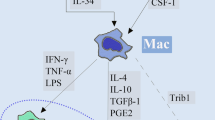Abstract
Macrophages are an abundant population in the tumor-infiltrating immune cells. The transcription factor NF-κB plays an important role in the response of tumor-associated macrophages (TAMs) to the tumor environmental cues. Detecting NF-κB activity in TAMs will help define the functional status of the TAMs. In this article, we describe several methods to detect NF-κB activity in TAM populations.
Access this chapter
Tax calculation will be finalised at checkout
Purchases are for personal use only
Similar content being viewed by others
References
Sorensen MD, Dahlrot RH, Boldt HB et al (2018) Tumour-associated microglia/macrophages predict poor prognosis in high-grade gliomas and correlate with an aggressive tumour subtype. Neuropathol Appl Neurobiol 44:185–206
Jackute J, Zemaitis M, Pranys D et al (2018) Distribution of M1 and M2 macrophages in tumor islets and stroma in relation to prognosis of non-small cell lung cancer. BMC Immunol 19:3
Miyasato Y, Shiota T, Ohnishi K et al (2017) High density of CD204-positive macrophages predicts worse clinical prognosis in patients with breast cancer. Cancer Sci 108:1693–1700
Nonomura N, Takayama H, Nakayama M et al (2011) Infiltration of tumour-associated macrophages in prostate biopsy specimens is predictive of disease progression after hormonal therapy for prostate cancer. BJU Int 107:1918–1922
Bailey C, Negus R, Morris A et al (2007) Chemokine expression is associated with the accumulation of tumour associated macrophages (TAMs) and progression in human colorectal cancer. Clin Exp Metastasis 24:121–130
Hansen BD, Schmidt H, von der Maase H et al (2006) Tumour-associated macrophages are related to progression in patients with metastatic melanoma following interleukin-2 based immunotherapy. Acta Oncol 45:400–405
Duong L, Radley-Crabb HG, Gardner JK et al (2018) Macrophage depletion in elderly mice improves response to tumor immunotherapy, increases anti-tumor T cell activity and reduces treatment-induced cachexia. Front Genet 9:526
Bader JE, Enos RT, Velázquez KT et al (2018) Macrophage depletion using clodronate liposomes decreases tumorigenesis and alters gut microbiota in the AOM/DSS mouse model of colon cancer. Am J Physiol Gastrointest Liver Physiol 314:G22–G31
Tham M, Khoo K, Yeo KP et al (2015) Macrophage depletion reduces postsurgical tumor recurrence and metastatic growth in a spontaneous murine model of melanoma. Oncotarget 6:22857–22868
Gabrusiewicz K, Hossain MB, Cortes-Santiago N et al (2015) Macrophage ablation reduces M2-like populations and jeopardizes tumor growth in a MAFIA-based glioma model. Neoplasia 17:374–384
Droller MJ, Gomolka D (1984) Macrophage depletion and manipulation of enhanced immune response in an animal model of bladder cancer. Cell Immunol 83:433–441
Griesmann H, Drexel C, Milosevic N et al (2017) Pharmacological macrophage inhibition decreases metastasis formation in a genetic model of pancreatic cancer. Gut 66:1278–1285
Niu M, Valdes S, Naguib YW et al (2016) Tumor-associated macrophage-mediated targeted therapy of triple-negative breast cancer. Mol Pharm 13:1833–1842
Zaynagetdinov R, Sherrill TP, Polosukhin VV et al (2011) A critical role for macrophages in promotion of urethane-induced lung carcinogenesis. J Immunol 187:5703–5711
Xiao G, Fu J (2011) NF-kappaB and cancer: a paradigm of Yin-Yang. Am J Cancer Res 1:192–221
Li L, Han L, Sun F et al (2018) NF-kappaB RelA renders tumor-associated macrophages resistant to and capable of directly suppressing CD8(+) T cells for tumor promotion. Onco Targets Ther 7:e1435250
Li D, Beisswenger C, Herr C et al (2014) Myeloid cell RelA/p65 promotes lung cancer proliferation through Wnt/beta-catenin signaling in murine and human tumor cells. Oncogene 33:1239–1248
Qu Z, Xiao G (2015) Systematic detection of noncanonical NF-kappaB activation. Methods Mol Biol 1280:121–154
Author information
Authors and Affiliations
Corresponding authors
Editor information
Editors and Affiliations
Rights and permissions
Copyright information
© 2021 Springer Science+Business Media, LLC, part of Springer Nature
About this protocol
Cite this protocol
Sun, F., Qu, Z., Xiao, G. (2021). Methods to Detect NF-κB Activity in Tumor-Associated Macrophage (TAM) Populations. In: Franzoso, G., Zazzeroni, F. (eds) NF-κB Transcription Factors. Methods in Molecular Biology, vol 2366. Humana, New York, NY. https://doi.org/10.1007/978-1-0716-1669-7_13
Download citation
DOI: https://doi.org/10.1007/978-1-0716-1669-7_13
Published:
Publisher Name: Humana, New York, NY
Print ISBN: 978-1-0716-1668-0
Online ISBN: 978-1-0716-1669-7
eBook Packages: Springer Protocols




